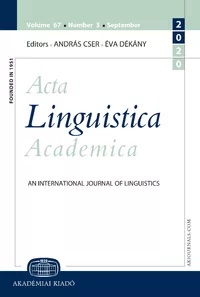Pushed out of arm's reach: Pronouns and spatial anaphora in Hungarian
Pushed out of arm's reach: Pronouns and spatial anaphora in Hungarian
Author(s): György Rákosi, Enikő TóthSubject(s): Syntax, Semantics
Published by: Akadémiai Kiadó
Keywords: binding; case; coreference; Hungarian; postposition; PP; pronoun; reflexive
Summary/Abstract: This paper investigates hitherto unnoticed variation in the linguistic coding of spatial anaphora in locative PPs in Hungarian. While Hungarian primarily employs reflexives in these configurations, it is well-known that pronouns are the default strategy in English, and the reflexive anaphor is allowed in locative PPs only in the presence of certain licensing factors. One such factor is the availability of body-oriented readings (Rooryck & Vanden Wyngaerd 2007, 2011), and we argue here that this plays an important role in Hungarian, too. The paper reports the findings of a corpus study and an online questionnaire study and shows that pronouns are not only acceptable in Hungarian spatial anaphora, but either outperform or form a viable alternative to reflexives when the location denoted by the PP is not close to the referent of the antecedent. A secondary effect of structure building is also observable in two configurations of the extended PP. We argue that the employment of a possessive structure in certain PPs, and moving a P-element to a CPPP cap may also contribute to saving pronouns in contexts of spatial anaphora.
- Issue Year: 69/2022
- Issue No: 2
- Page Range: 235-255
- Page Count: 21
- Language: English

